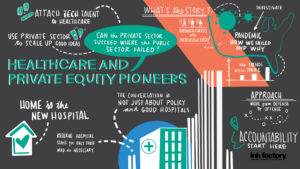An illustrious group of healthcare private equity pioneers discussed how healthcare investing has evolved from inception to current state and what the future holds. Moderated by Michael Lewis, author of The Big Short, Moneyball, The Blind Side and Liar’s Poker, it featured insights from Senator Bill Frist, MD, founder of Frist Cressey Ventures; Annie Lamont, co-founder and Managing Partner of Oak HC/FT; Curtis Lane, founding partner of WindRose Health Investors; and Ira Coleman, Chairman of McDermott Will & Emery.
Below are the top takeaways for HPE New York 2020 half day session: Healthcare Private Equity Pioneers, click here to access the full webinar.
Investment in healthcare private equity continues to accelerate, even amid disruption. In the past, healthcare made up only a small portion of private equity funds, but pioneers helped make it mainstream. “The amount of infrastructure, commitment and capability focused exclusively on healthcare is becoming commensurate with the size of healthcare relative to the economy,” Mr. Lane said. “I think that’s changed pretty significantly and is continuing to change very quickly.”
One of the most dramatic changes in the field of healthcare private equity since its inception is the ongoing transformation of the healthcare system and the opportunities that transformation has created for entrepreneurs outside of traditional healthcare roles. As virtual health companies and other digital-focused endeavors began to emerge young entrepreneurs started to come into healthcare,” Ms. Lamont said. “You started seeing tech talent attached to healthcare problems.”
The COVID-19 pandemic has dramatically accelerated investment trends. Digital care delivery and virtualization are seeing particularly high growth rates, Ms. Lamont said, in close connection with the sectors of home health, mental health and primary care. “We want to support everyone in the home right now, and we want to do that in the smartest way,” she said. “This is an industry that has been stuck, and there has been very little innovation. All of a sudden, the resources are coming and the payors are thinking differently. It’s incredibly exciting, because we are going to move healthcare forward.”
Venture capital can be a vital means for tackling seemingly insurmountable problems, Dr. Frist said. COVID-19 has forced healthcare to pivot from a historically defensive stance to a more proactive and offensive position. “We have a huge opportunity,” he added. “We now need to solve this problem and address it. We need solutions for the vulnerable population.” Public policy and excellent care alone are often insufficient to tackle big issues. The private sector can help take innovative ideas and solutions and bring them to scale.
To catch up on all of the webinars in our HPE New York 2020 series, please click here.







